UN urges $2.5-trillion in pandemic aid to developing nations
The United Nations has called for a $2.5-trillion aid package to help developing countries face the economic crisis caused by the coronavirus pandemic.
According to a report released by the United Nations Conference on Trade, Investment and Development (UNCTAD) on Monday, two-thirds of the global population who live in developing countries, excluding China, face "unprecedented economic damage" from the crisis.
"It is ... a matter of immediate urgency for the international community to co-ordinate appropriate economic rescue packages with a more global reach to address the looming financing gap which many developing countries are now imminently facing," the report said.
UNCTAD said the aid package will include a $1 trillion liquidity injection and a $1 trillion dollar debt relief package, as well as a $500-billion "Marshall Plan for Health Recovery."
The novel coronavirus, known as COVID-19, initially emerged in China late last year and is now spreading across the globe. Worldwide, the number of cases soared past 740,000, including more than 35,000 deaths, and with nearly 3.4 billion people under lockdown.
The economic damage has also intensified, with business districts beginning to empty and stock markets to tumble.
Analysts say the world economy is headed for a sharp downturn, where several countries could plunge into recession this year.
"Economic fallout from the shock is ongoing and increasingly difficult to predict, but there are clear indications that things will get much worse for developing economies before they get better," UNCTAD Secretary General Mukhisa Kituyi said in a statement.
"Lacking the monetary, fiscal and administrative capacity to respond to this crisis, the consequences of a combined health pandemic and a global recession will be catastrophic for many developing countries," the UN agency warned.
Separately, Richard Kozul-Wright, director of globalization and development strategies at UNCTAD, said the world's 20 largest economies had "promised to do 'whatever it takes' to stop their firms and households from taking a heavy loss of income."
"If G20 leaders are to stick to their commitment of 'a global response in the spirit of solidarity,' there must be commensurate action for the six billion people living outside the core G20 economies," Kozul-Wright said.
With fears mounting of a global recession if not depression, leaders from the Group of 20 major economies held crisis talks by video link Thursday, pledging a "united front" to fight the outbreak -- along with an enormous financial injection.
They vowed $5 trillion to stave off global economic collapse and pledged "robust" support for developing nations, where coronavirus could next take hold after ravaging China and then Europe.
Spain announces 812 virus deaths in 24 hours
Spain has confirmed another 812 deaths in 24 hours from the coronavirus, bringing the total number of deaths to 7,340, according to health ministry figures.
It is the first decline in the number of deaths in a 24-hour period since Thursday in Spain, which has the world's second most deadly outbreak after Italy. Spain recorded 838 virus deaths on Sunday.
The number of confirmed cases in Spain has now reached 85,195 -- after the one-day increase of 8.0 percent.
However, officials have pointed to a slower growth rate for both deaths and confirmed cases and expressed hope that the peak of the outbreak was approaching.
The percentage increase in the number of deaths on Monday over the previous day was of 12.4 percent, less than half the increase of 27 percent recorded on Wednesday.
Spain imposed a near-total nationwide lockdown on March 14 to try to curb the spread of the virus, banning people from leaving their homes except to go to work, buy food and medicine or care for a sick relative.
Prime Minister Pedro Sanchez on Saturday announced even stricter lockdown measures which will force all non-essential workers in the nation of around 47 million residents to stay home for the next two weeks.
S Korea to pay families hundreds of dollars to ease coronavirus impact
South Korea will make emergency cash payments to all but the richest families and draw up a second supplementary budget next month in a bid to ease the drawn-out economic impact of the coronavirus outbreak, President Moon Jae-in said on Monday.
Moon, after an emergency meeting with economic policymakers, said an "emergency disaster relief payment" of up to 1 million won ($820) would be made to all households except the top 30% by income, totaling some 9.1 trillion won ($7.44 billion).
Officials said they would prepare another extra budget worth 7.1 trillion won ($5.80 billion) for parliamentary approval in April and some small- and medium-sized companies would be exempt from paying utility bills starting this month.
"Citizens suffered from the coronavirus and they all deserve to be rewarded for their pain and participation in preventive efforts," Moon told the meeting in comments broadcast on television.
"There is a need for the government to reserve as much financial power to brace for an economic shock with no end in sight and promptly respond to labor market insecurity and any potential corporate liquidity crisis."
The new package is the latest in a recent series of steps the government has taken to ease the pressure on Asia's fourth-largest economy.
Finance Minister Hong Nam-ki said the government would have to issue deficit-covering bonds to at least partially fund the second budget.
Previous measures have included an interest rate cut, a 11.7 trillion won ($9.54 billion) supplementary budget, raising a cap on currency forward positions for banks and a rescue package for companies totaling 100 trillion won ($81.6 billion).
South Korea has largely managed to control the epidemic and drawn worldwide praise for its testing. Its daily number of new infections has been hovering at up to 100 for the past three weeks. Authorities have tightened border checks as the number of imported cases has risen.
The Korea Centers for Disease Control and Prevention (KCDC) reported 78 new cases on Monday, at least 13 of whom were people who arrived from abroad, most of them South Koreans.
The national tally stood at 9,661 and the death toll rose by four to 162 as of late Monday. The KCDC said 195 more people had recovered from the virus, bringing the total to 5,228.
Of the new cases, at least 10 were linked to a church in western Seoul, while a hospital in the hard-hit city of Daegu saw more than 75 infections over the past few days.
South Korea announced on Sunday that all overseas arrivals would have to undergo two weeks of mandatory quarantine starting on April 1.
Breaking the rules is punishable by a year in prison or a fine of up to 10 million won ($8,160).
Indian police fire tear gas at workers defying coronavirus lockdown
Police in western India have fired tear gas to disperse a stone-pelting crowd of migrant workers defying a three-week lockdown against the coronavirus that has left hundreds of thousands of poor without jobs and hungry, authorities say.
Prime Minister Narendra Modi ordered the country's 1.3 billion people to remain indoors until April 15, declaring such self-isolation was the only hope to stop the viral pandemic.
But the vast shutdown has triggered a humanitarian crisis with hundreds of thousands of poor migrant laborers employed in big cities such as Delhi and Mumbai seeking to head to their homes in the countryside on foot after losing their jobs.
Many have been walking for days, some with families including small children, on deserted highways with little access to food or water.
On Sunday, about 500 workers clashed with police in the western city of Surat demanding they be allowed to go home to other parts of India because they had no jobs left.
“The police tried to convince them that it is not possible since buses or trains are not available...However, the workers refused to budge, and started pelting stones at police,” Surat deputy commissioner of police Vidhi Chaudhari said.
She said the workers, most of them employed in the shuttered textile industry in Surat, were driven indoors by tear gas volleys and on Monday 93 of them were detained for violating lockdown orders.
India has registered 1,071 cases of the coronavirus, of whom 29 have died, the health ministry said on Monday. The number of known cases is small compared with the United States, Italy and China, but health officials say India is weeks away from a huge surge that could overwhelm its weak public health system.
A health official said the large scale movement of people into the countryside risked spreading the coronavirus widely, compounding the challenge of containing the outbreak in the world's second most populous country.
"It's an evolving situation with daily new challenges coming up, like having migratory populations moving from one place to another. Like non-affected states adjoining affected states," said Dr S.K. Singh, director of the National Centre for Disease Control, which investigates and recommends control measures for outbreaks of illness.
In the northern state of Uttar Pradesh, health workers dressed in protection suits sprayed disinfectant on a group of migrant workers who were also trying to make the journey home to their villages, local television showed. They were made to sit on a street corner in the Bareilly district and doused with hose pipes, prompting anger on social media.
Nitish Kumar, the top government official in the district, later said health workers had been ordered to disinfect buses being used by the local authorities but in their zeal they had also turned their hoses onto migrant workers.
"I have asked for action to be taken against those responsible for this," he said in a tweet.
The federal government said on Monday that it had no plans to extend the shutdown beyond the three-week period.
But neighboring Nepal announced it would prolong its shutdown for another week from Tuesday. The landlocked country has reported only five cases of the virus and no deaths, but it is concerned contagion will spread as more people travel.
German economy could shrink by 5.4% this year due to coronavirus
The coronavirus outbreak will push Germany into recession in the first half of this year and could result in output in Europe's largest economy contracting by up to 5.4% this year, Germany's council of economic advisers say.
Germany is in virtual lockdown, with more than 57,000 people infected and 455 deaths from the virus.
Schools, shops, restaurants and sports facilities have closed and many firms have stopped production to help slow the spread of the disease.
The panel that advises the government said its baseline scenario - in which the economic situation would normalize over the summer - was for the economy to contract by 2.8% this year before potentially growing by 3.7% next year.
The advisers said a more marked 'V' shaped recession curve with widespread halts to production or longer-lasting public health measures could lead to the economy contracting by 5.4% this year before growing by 4.9% in 2021 thanks in part to a statistical overhang.
"The coronavirus outbreak has stopped the incipient recovery," the advisors said in a report that they handed to the government on March 23 but published on Monday. "The German economy will shrink significantly in 2020."
Others have been more pessimistic, with the Ifo Institute for Economic Research saying output could decline by as much as 20% this year and the German Economic Institute saying it could shrink by 10%.
Parliament suspended Germany's constitutionally enshrined debt brake last week and approved a stimulus package worth more than 750 billion euros ($831.60 billion) to help cope with the economic fallout.
Data published last week painted a gloomy picture, with German business morale and private sector business activity falling to their lowest levels since the global financial crisis of 2008-2009.
Almost one in five German companies sees itself at acute risk of insolvency.
Several think tanks and politicians have said Germany must ensure its shutdown does not cripple the economy, but Chancellor Angela Merkel spoke out at the weekend against a quick loosening of restrictions.
Volker Wieland, one of the economic advisers, said the crisis would transform some sectors of the economy, with the experience of working from home and video conferencing to have an impact on business travel, for example.
But he said these areas were not big enough, or their impact negative enough, for this to affect the economy much overall.
The panel said euro zone governments could stabilize expectations on financial markets by sending a clear signal that extra fiscal resources will be immediately made available via existing instruments such as the European Stability Mechanism if necessary.
Advisers were deeply divided over whether issuing common euro bonds was the right response to the crisis.
But one, Achim Truger, said the idea seemed to be gaining ground even among leaders of EU countries that were traditionally skeptical of proposals for euro bonds.
"In the short term it's good to focus on the ESM because that's quick," he said. "But the government would be well advised not to rule out a common solution."
Israel’s Netanyahu under precautionary COVID-19 quarantine
Israeli Prime Minister Benjamin Netanyahu and his close aides have been placed under precautionary quarantine after a staffer within his office tested positive for COVID-19, the premier's office said Monday.
In a statement, Netanyahu's office said the quarantine decision was precautionary as the veteran prime minister had not been in recent proximity with the ill staffer.
"The preliminary assessment is that there is no need for the prime minister to be quarantined, as he did not come into close contact with the individual and did not personally meet with that person," the statement said.
"Over the past two weeks the two were never in the same room at the same time," it added.
The statement further noted that the "epidemiological investigation" was ongoing and that Netanyahu and "his close staff would be in confinement until (tests) were completed."
A statement from the Knesset, Israel's parliament, identified the staffer as Rivka Paluch, Netanyahu's parliamentary aide, noting three dates she had been in the building.
Members of the Knesset and employees have already been instructed to follow the health ministry's orders and self-quarantine if they were in her vicinity, the statement said.
The Knesset said it was offering footage from its surveillance cameras to the health ministry for them to see where and when Paluch had been in the building, for the health professionals to determine which measures need be taken.
Israel, which has more than 4,000 confirmed COVID-19 cases, has imposed severe restrictions to contain the spread of the virus, including a total ban on non-essential movements.
Netanyahu's office stressed that he has had limited inter-personal contact in recent weeks, conducting "most of his meetings via video conferencing from his residence."
The news comes as Netanyahu, 70, is widely expected to agree on an emergency coalition with his election rival Benny Gantz to tackle the coronavirus pandemic.
The two fought three bitter but inconclusive elections over the past year, with neither securing enough support to form a viable coalition administration.
Gantz, a centrist, was elected speaker of Israel's parliament last week and has committed to backing an emergency coalition with Netanyahu, citing the need to combat COVID-19.
Japan, IOC set July 23 next year for start of delayed Olympics
The postponed Olympic Games will now begin on July 23 next year and run until August 8, the head of the Tokyo 2020 organizing committee says, as the coronavirus pandemic made it impossible to plan and prepare for them properly this year.
The Games were postponed last week - the first such delay in the 124-year history of the modern Olympics. The move was a huge blow for Japan, which invested $13 billion in the run-up to the event and raised $3 billion from domestic sponsors.
Yoshiro Mori, the head of the Tokyo 2020 organizing committee, confirmed the new dates after he made the decision with the International Olympic Committee. Mori said the Paralympic Games would run from August 24-September 5.
"The Tokyo Olympics Games and the successful delivery of these Games will be how we overcome all the problems that the world is facing and that the Olympics could be a symbol for this," Mori said. "These Games are going to have great historical significance."
Earlier on Monday, the Games' chief executive, Toshiro Muto, said the committee was moving "in the direction" of honoring tickets bought for the 2020 Games at the rescheduled event, or providing refunds in case of scheduling changes.
"We want to honor the hopes of all those who purchased the tickets amid high demand," Muto told a news conference.
It was too early to say what the additional costs of the delay would be, Muto said.
The IOC and Japanese government succumbed to intense pressure from athletes and sporting bodies around the world last Tuesday by agreeing to push back the Games because of the coronavirus pandemic.
The pandemic had already led to many sporting events around the world being delayed or canceled.
After weeks of insisting the Olympics would go ahead, organizers bowed to what many said was the inevitable and delayed what is the world's premier sporting gathering.
Sporting bodies, including the World Athletics association, the International Triathlon Union, and FINA, the international swimming federation, all followed up with statements of support for the delay.
The postponement "gives our athletes the time they need to get back into training and competition," World Athletics said.
The association is also working on new dates in 2022 for the World Athletics Championships, it said.
The Athletics and Swimming world championships were scheduled to take place next summer around the new Olympics dates, presenting organizers with potential clashes in timing.
And problems have already arisen in planning for venues for next year, although organizers have yet to be told that they cannot use any facilities, Muto said at the news conference announcing the new date.
The Tokyo 2020 Olympics must acknowledge the coronavirus crisis which forced their postponement and incorporate it into next year's opening ceremony, executive producer Marco Balich told Reuters from his home in Milan.
More than 720,000 people have been infected around the world with about 34,000 deaths and governments are taking ever tougher measures such as lockdowns to try to halt the outbreak and support overburdened medical infrastructure.
N Ireland to release around 200 prisoners to stem COVID-19 spread
Around 200 prisoners will be temporarily released from Northern Irish jails in a bid to stem the spread of coronavirus in the inmate population, the province's justice minister says.
"If we are to manage the rapidly developing crisis we are facing, it is vital that we begin now to take steps to reduce our prisoner population," Naomi Long said in a statement on Monday.
Long added that the regional prison service would "anticipate the release of fewer than 200 individuals" from its population of around 1,500.
The minister said she would use the powers open to her office to free "those prisoners who are due to be released automatically during the next three months."
Numerous categories of prisoners will not be eligible for the temporary release, including those serving life sentences or held for serious matters including domestic violence, terror and murder convictions.
Those released will be subject to a curfew, as well as bans on victim contact, alcohol and media engagement.
They will also be subject to recall to prison at any time regardless of whether these conditions are violated.
As of Monday morning there had been 533 confirmed cases of coronavirus in Northern Ireland, and 22 deaths attributed to it, according to the region's public health officials.
A smaller inmate population will allow the Northern Ireland Prison Service to reduce the practice of inmates "doubling up" in cells, to allow "social distancing" measures aimed at slowing the spread of COVID-19.
Long said the "pandemic is causing us to consider measures that only a few weeks ago would have been unthinkable."
Britain has thus far had 19,522 confirmed cases of the coronavirus and 1,228 deaths.
Prime Minister Boris Johnson's spokesman said Monday that officials were "actively looking at" the release of some "vulnerable" inmates from English and Welsh jails.
It is thought a small number of pregnant women in prisons in the two nations could be temporarily released due to the pandemic.
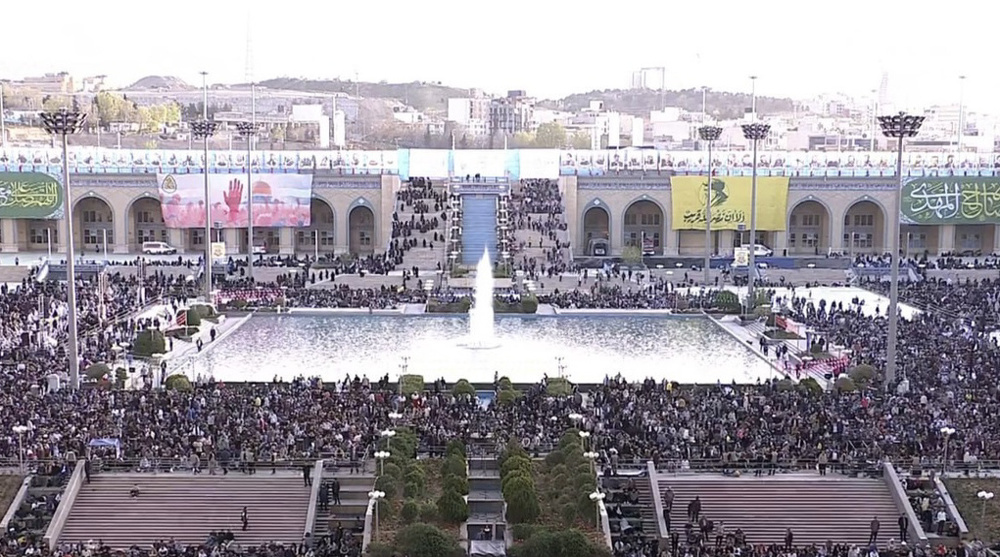
Eid al-Fitr celebrated in Iran, other countries as holy month of Ramadan comes to a close
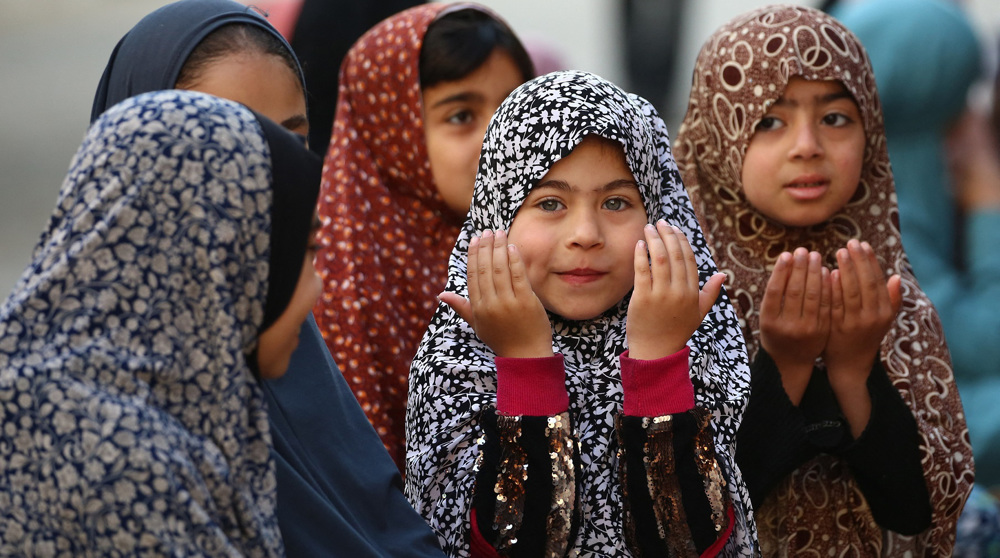
Iran FM calls for more unity, empathy among Muslims in Eid message
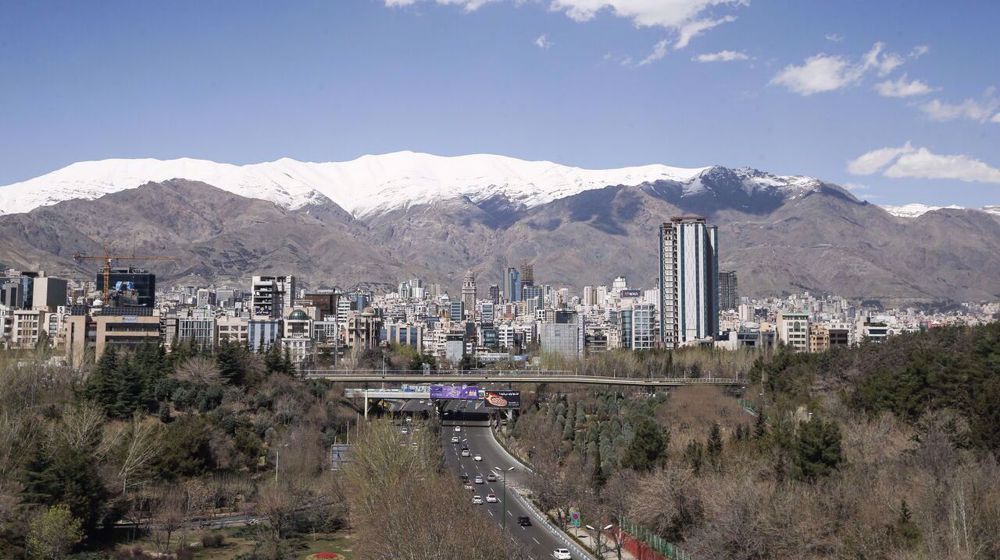
Tehran ranked world’s 3rd capital with cleanest air
VIDEO | Columbia University students chain themselves to gate in support of Mahmoud Khalil
Hungary to quit ICC as fugitive Israeli PM visits European state
IRGC: Resistance front will end Israel’s ‘disgraceful’ existence
EU calls Trump tariffs ‘major blow to world economy’ as China vows retaliation
VIDEO | Press TV's news headlines
VIDEO | Gaza's healthcare system collapsing amid ongoing siege
Yemeni army shoots down second advanced US MQ-9 drone in single week
Trump targeting Ukraine's mineral wealth


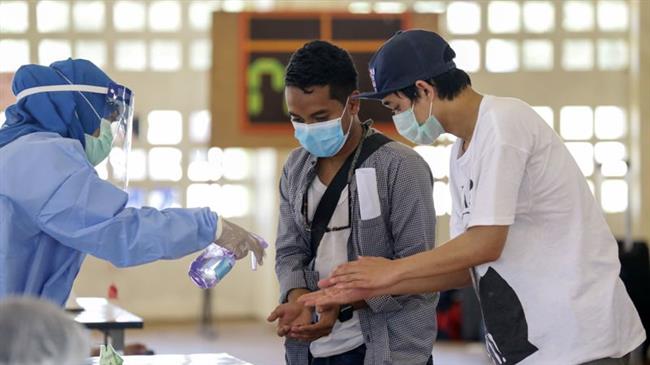










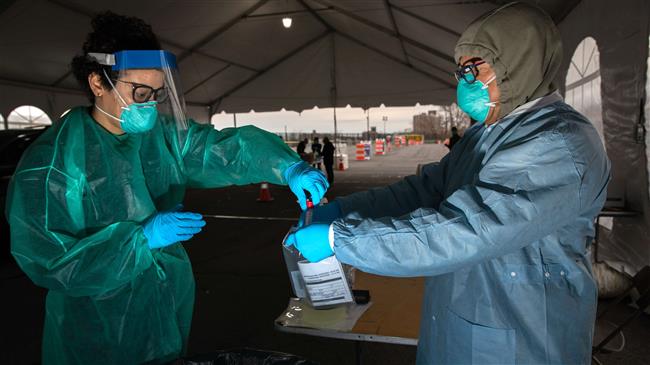
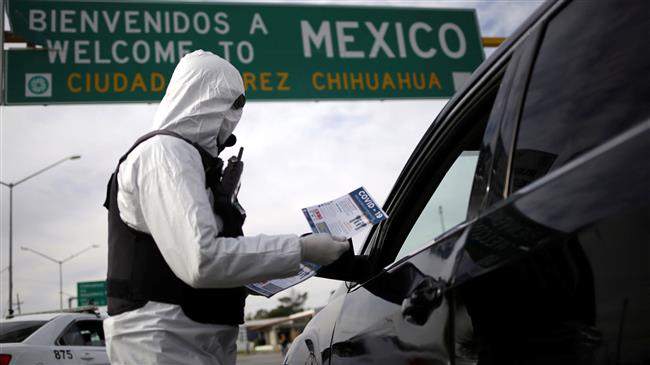
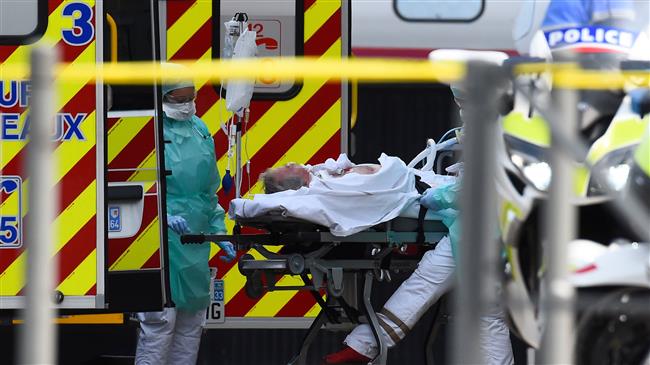
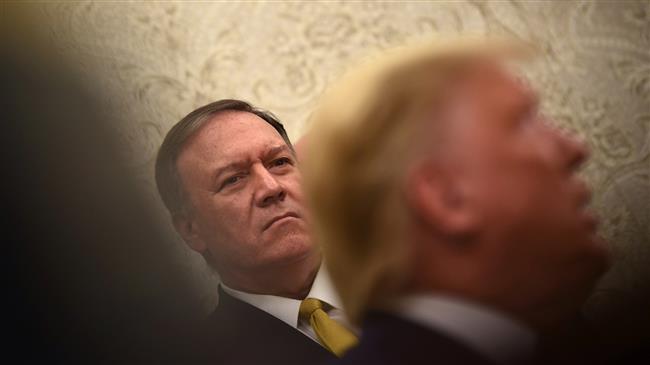

 This makes it easy to access the Press TV website
This makes it easy to access the Press TV website